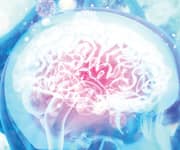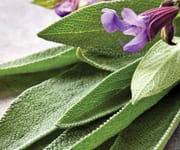Life Extension Magazine®
As we age, our cognitive abilities decline.
But it doesn’t have to be this way.
Scientists have identified specific nutrients that protect the aging brain.1-10
One of these is a sage extract that has demonstrated remarkable cognitive-enhancing activities.11
In clinical studies, this sage extract increased memory performance in older adults by nearly 60%.
A measure of attention improved by about 2.5-fold—within hours of ingestion.12
In addition to these human benefits, this sage extract has been shown to increase lifespan by 12% in an animal model of aging.11
Together with other nutrients, this sage extract can help our brains function in a more youthful manner.
Preserving Brain Power

Minor deterioration in brain function is known as mild cognitive impairment. It affects memory, attention, and other mental processes.
More severe loss is considered dementia, which includes Alzheimer’s disease.
Alzheimer’s and other forms of dementia are characterized in part by lower levels of the neurotransmitter acetylcholine.
Losing memory and brainpower is not “a part of life” that everyone must endure.
Research has documented that certain nutrients help maximize brain function. The herb sage stands out for its ability to protect neurons and enhance cognitive function.13-18
A team of scientists has identified a new sage extract that provides powerful brain-protective effects not found in other sage preparations.11,12,19
 |
What You Need to Know
Sage Boosts Brain Power
-
Scientists have identified a unique sage extract that increases memory performance in older adults by nearly 60% and improves a measure of attention by 2.5-fold—within hours of ingestion.
-
This new extract has neuroprotective capabilities not seen in other sage preparations, and it shows the ability to extend lifespan in animal models of aging by 12%.
This sage extract can help support brain health, especially if taken with other supplements with proven brain benefits.
Cognitive Benefits of Sage

Sage is rich in polyphenols that have demonstrated clinical benefits and fascinating preclinical findings.
But the most compelling benefit of sage may be its capacity for cognitive protection.
In a series of clinical trials, scientists found that younger individuals who took sage extract benefited within hours from improved mood, reduced anxiety, enhanced long-term memory, and reduced mental fatigue.13-16
Researchers also documented cognitive benefits in older people with dementia.17,18
In a randomized clinical trial on patients with mild-to-moderate Alzheimer’s, the cognitive scores of a placebo group deteriorated by about 22% over four months. But the scores of the group that supplemented with sage extract improved by about 26%.18
That’s a remarkable result. But even stronger brain protection is available from a new sage extract.
An Improved Form of Sage
A group of European scientists has identified a specific form of sage with benefits that go beyond traditional sage extracts.
This extract has a unique chemical fingerprint,19 one distinctively suited to support brain function.
In fact, this newer sage extract has shown, in preclinical studies, superior effects to other sage sources and to cognitive drugs.11,20
Scientists enlisted adults over age 64 for a clinical study of its effects on cognition.12 Brain function tests were conducted both before and after participants were given either the sage extract or a placebo.
Here are the remarkable findings:12
-
Memory performance in those receiving this new sage extract was boosted, compared to placebo, by roughly 60%.
-
A measure of attention in sage-supplemented participants was enhanced, compared to placebo, by about 2.5-fold.
These improvements occurred within hours of taking this new sage extract.12
How It Works
Life Extension® has collaborated with researchers at a group called Sibelius to determine how this particular extract enhances memory and attention.
Traditional sage helps protect the aging brain and supports cognition by:
-
Reversing decreases of the neurotransmitter acetylcholine,12,15-17,21,22 which is critical for attention, memory, and reasoning,23-25
-
Boosting levels of neurotrophins,22 proteins that encourage creation of new brain cells and repair of damaged brain cells,26-27 and
-
Reducing inflammation22 which is associated with cognitive deficits.28
The new sage extract does all this. But scientists have identified several additional ways that this extract, with its different chemical makeup, may deliver cognitive enhancements.
Improved Lipid Metabolism and Insulin Signaling
In a compelling preclinical analytic study, this unique sage extract was found to increase expression of genes related to lipid metabolism and insulin signaling—which are both tied to enhanced longevity.21 Blood tests in aging adults often reveal dangerous increases in glucose, cholesterol, and triglycerides.
In a model of aging using roundworms, this extract resulted in a 12% lifespan increase. Other sage sources did not extend life.11
Stronger Neurotransmitter Signaling
In addition to the increased acetylcholine levels induced by other sage sources, this extract boosts the activity of other neurotransmitters such as GABA (gamma-aminobutyric acid) and glutamate.21
This helps explain the profound cognitive benefits observed in human studies.
Increased Blood Flow to the Brain
As we age, our brain suffers blood flow reductions due to vascular stiffening and damage to delicate capillary beds.
This new sage extract has vasodilation properties, which means it can open vessels that supply vital blood and oxygen to the brain.21
The age-related reduction of blood flow is a precursor to memory loss and dementia.29-33
Other Nutrients for Brain Health
Sage is just one of several nutrients known to protect and enhance brain health. By taking it with others that complement its activity, it can maximize cognitive benefits.
Phosphatidylserine
Phosphatidylserine is an essential phospholipid component of nerve cell membranes and the myelin sheath that covers and protects nerve cells, including brain cells. The myelin sheath supports the conduction of nerve impulses throughout the nervous system.1,34,35
Taking phosphatidylserine preserves cognitive function and may reduce the structural deterioration in the nervous system that occurs with age. In studies, people who took it scored higher on short-term memory and concentration tests.1
Blueberry
Blueberries are packed with anthocyanins, powerful compounds present in a variety of plants including fruits and vegetables. Anthocyanins exert a broad range of health-promoting effects, including defense against oxidative stress, as well as modulation of gene expression and cell-signaling pathways.36
Recent human trials have demonstrated that blueberries improve memory and other cognitive performance in older subjects, and boost mood and cognition in children and young adults.3-5,37,38
Vinpocetine
Vinpocetine, a compound derived from the periwinkle plant, has been reported to have benefits for cognition and degenerative disorders of the brain such as Alzheimer’s and Parkinson’s disease. Vinpocetine helps to dilate (widen) blood vessels to the brain, improving blood flow and stimulating brain metabolism.6
Pregnenolone
Studies in animals and humans have shown that pregnenolone, a hormone produced by the adrenal gland, appears to be a neuroprotectant, defending the brain from various forms of injury.39,40
It has also been found to have positive effects on mood, memory, and other aspects of cognition.7
Ashwagandha
Ashwagandha is an Indian herb, also referred to as “Indian ginseng.” It has been used in traditional Indian medicine as a nerve tonic for thousands of years.
In modern research, ashwagandha has demonstrated neuroprotective effects and improvements in mood and cognition.8,9 One study in patients suffering from mild cognitive impairment found that ashwagandha supplementation led to improvements in memory, attention, and decision making.8
Summary

Scientists have identified a unique sage extract that has a biological makeup and neuroprotective effects never seen before.
Clinical evidence demonstrates that, within just hours of ingestion, this extract increases memory performance in older adults and improves measures of attention.
This new extract was also shown to increase lifespan by 12% in an animal model of aging.
Sage offers critical protection against cognitive decline.
Taken with other neuroprotective nutrients, such as phosphatidylserine, blueberry, vinpocetine, pregnenolone, and ashwagandha, it can be part of a multivitamin for the brain.
If you have any questions on the scientific content of this article, please call a Life Extension® Wellness Specialist at 1-866-864-3027.
References
- Glade MJ, Smith K. Phosphatidylserine and the human brain. Nutrition. 2015 Jun;31(6):781-6.
- Taylor CL. Qualified health claim: final decision letter - phosphatidylserine and cognitive dysfunction and dementia. U.S. Food & Drug Administration;2003.
- Whyte AR, Cheng N, Fromentin E, et al. A Randomized, Double-Blinded, Placebo-Controlled Study to Compare the Safety and Efficacy of Low Dose Enhanced Wild Blueberry Powder and Wild Blueberry Extract (ThinkBlue) in Maintenance of Episodic and Working Memory in Older Adults. Nutrients. 2018 May 23;10(6).
- McNamara RK, Kalt W, Shidler MD, et al. Cognitive response to fish oil, blueberry, and combined supplementation in older adults with subjective cognitive impairment. Neurobiol Aging. 2018 Apr;64:147-56.
- Miller MG, Hamilton DA, Joseph JA, et al. Dietary blueberry improves cognition among older adults in a randomized, double-blind, placebo-controlled trial. Eur J Nutr. 2018 Apr;57(3):1169-80.
- Zhang YS, Li JD, Yan C. An update on vinpocetine: New discoveries and clinical implications. Eur J Pharmacol. 2018 Jan 15;819:30-4.
- Vallee M. Neurosteroids and potential therapeutics: Focus on pregnenolone. J Steroid Biochem Mol Biol. 2016 Jun;160:78-87.
- Choudhary D, Bhattacharyya S, Bose S. Efficacy and Safety of Ashwagandha (Withania somnifera (L.) Dunal) Root Extract in Improving Memory and Cognitive Functions. J Diet Suppl. 2017 Nov 2;14(6):599-612.
- Singh N, Bhalla M, de Jager P, et al. An overview on ashwagandha: a Rasayana (rejuvenator) of Ayurveda. Afr J Tradit Complement Altern Med. 2011;8(5 Suppl):208-13.
- Wurtman RJ. Synapse formation in the brain can be enhanced by co-administering three specific nutrients. Eur J Pharmacol. 2017 Dec 15;817:20-1.
- Sibelius. Internal Report. ChronoscreenTM Analysis: Cognition Enhancing Drugs & Natural Extracts. 2018.
- Scholey AB, Tildesley NT, Ballard CG, et al. An extract of Salvia (sage) with anticholinesterase properties improves memory and attention in healthy older volunteers. Psychopharmacology (Berl). 2008 May;198(1):127-39.
- Tildesley NT, Kennedy DO, Perry EK, et al. Salvia lavandulaefolia (Spanish sage) enhances memory in healthy young volunteers. Pharmacol Biochem Behav. 2003 Jun;75(3):669-74.
- Tildesley NT, Kennedy DO, Perry EK, et al. Positive modulation of mood and cognitive performance following administration of acute doses of Salvia lavandulaefolia essential oil to healthy young volunteers. Physiol Behav. 2005 Jan 17;83(5):699-709.
- Kennedy DO, Dodd FL, Robertson BC, et al. Monoterpenoid extract of sage (Salvia lavandulaefolia) with cholinesterase inhibiting properties improves cognitive performance and mood in healthy adults. J Psychopharmacol. 2011 Aug;25(8):1088-100.
- Kennedy DO, Pace S, Haskell C, et al. Effects of cholinesterase inhibiting sage (Salvia officinalis) on mood, anxiety and performance on a psychological stressor battery. Neuropsychopharmacology. 2006 Apr;31(4):845-52.
- Perry NS, Bollen C, Perry EK, et al. Salvia for dementia therapy: review of pharmacological activity and pilot tolerability clinical trial. Pharmacol Biochem Behav. 2003 Jun;75(3):651-9.
- Akhondzadeh S, Noroozian M, Mohammadi M, et al. Salvia officinalis extract in the treatment of patients with mild to moderate Alzheimer’s disease: a double blind, randomized and placebo-controlled trial. J Clin Pharm Ther. 2003 Feb;28(1):53-9.
- Sibelius cognition enhancement product presentation. 2018.
- Available at: https://www.nutraceuticalsnow.com/articles/2018/03/05/interrogating-molecular-responses-nutraceuticals-gain-insights-health-benefits/. Accessed September 14, 2018.
- Confidential S. Sage Gene Expression Analysis. 2018.
- Lopresti AL. Salvia (Sage): A Review of its Potential Cognitive-Enhancing and Protective Effects. Drugs R D. 2017 Mar;17(1):53-64.
- Garcia-Ayllon MS, Small DH, Avila J, et al. Revisiting the Role of Acetylcholinesterase in Alzheimer’s Disease: Cross-Talk with P-tau and beta-Amyloid. Front Mol Neurosci. 2011;4:22.
- Klinkenberg I, Sambeth A, Blokland A. Acetylcholine and attention. Behav Brain Res. 2011 Aug 10;221(2):430-42.
- Mueller C, Perera G, Hayes RD, et al. Associations of acetylcholinesterase inhibitor treatment with reduced mortality in Alzheimer’s disease: a retrospective survival analysis. Age Ageing. 2018 Jan 1;47(1):88-94.
- Huang EJ, Reichardt LF. Neurotrophins: roles in neuronal development and function. Annu Rev Neurosci. 2001;24:677-736.
- Erickson KI, Prakash RS, Voss MW, et al. Brain-derived neurotrophic factor is associated with age-related decline in hippocampal volume. J Neurosci. 2010 Apr 14;30(15):5368-75.
- Hasanein P, Felehgari Z, Emamjomeh A. Preventive effects of Salvia officinalis L. against learning and memory deficit induced by diabetes in rats: Possible hypoglycaemic and antioxidant mechanisms. Neurosci Lett. 2016 May 27;622:72-7.
- Chen JJ, Rosas HD, Salat DH. Age-associated reductions in cerebral blood flow are independent from regional atrophy. Neuroimage. 2011 Mar 15;55(2):468-78.
- Bell RD, Zlokovic BV. Neurovascular mechanisms and blood-brain barrier disorder in Alzheimer’s disease. Acta Neuropathol. 2009 Jul;118(1):103-13.
- Dickstein DL, Walsh J, Brautigam H, et al. Role of vascular risk factors and vascular dysfunction in Alzheimer’s disease. Mt Sinai J Med. 2010 Jan-Feb;77(1):82-102.
- Ruitenberg A, den Heijer T, Bakker SL, et al. Cerebral hypoperfusion and clinical onset of dementia: the Rotterdam Study. Ann Neurol. 2005 Jun;57(6):789-94.
- Caroli A, Testa C, Geroldi C, et al. Cerebral perfusion correlates of conversion to Alzheimer’s disease in amnestic mild cognitive impairment. J Neurol. 2007 Dec;254(12):1698-707.
- Available at: https://www.drugbank.ca/drugs/DB00144. Accessed September 11, 2019.
- Available at: https://www.ncbi.nlm.nih.gov/books/NBK27954/. Accessed September 11, 2019.
- Burton-Freeman B, Sandhu A, Edirisinghe I. Anthocyanins. In: Gupta RC, ed. Nutraceuticals. Boston: Academic Press; 2016:489-500.
- Khalid S, Barfoot KL, May G, et al. Effects of Acute Blueberry Flavonoids on Mood in Children and Young Adults. Nutrients. 2017 Feb 20;9(2).
- Whyte AR, Schafer G, Williams CM. Cognitive effects following acute wild blueberry supplementation in 7- to 10-year-old children. Eur J Nutr. 2016 Sep;55(6):2151-62.
- Veiga S, Garcia-Segura LM, Azcoitia I. Neuroprotection by the steroids pregnenolone and dehydroepiandrosterone is mediated by the enzyme aromatase. J Neurobiol. 2003 Sep 15;56(4):398-406.
- Borowicz KK, Piskorska B, Banach M, et al. Neuroprotective actions of neurosteroids. Front Endocrinol (Lausanne). 2011;2:50.

